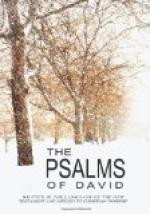The Psalms of David
Imitated in the Language of
The New Testament
And Applied to
The Christian State and Worship
By I. Watts D.D.
Luke xxiv. 44
All things must be fulfilled which were written in
the Psalms
concerning me.
HEB. xi. 32, 40.
David, Samuel, and the prophets — that
they without us should
not be made perfect.
Transcriber’s Note.
There are significant differences in the numerous reprints of Isaac Watts’ “Psalms.” The first generation of this Project Gutenberg file was from an 1818 printing by C. Corrall of 38 Charing Cross, London.
The Index and the Table of First Lines have been omitted for the following reasons: 1. They refer to page numbers that are here expunged; and 2. In this electronic version key words, etc., can be easily located via searches.
Separate numbers have been added to Psalms that have more than one part or version, for example: Psalm 51:1; Psalm 51:2; etc.
The Life of Isaac Watts, D.D.
by
Dr. Johnson.
From his lives of the most eminent English Poets.
The Poems of Dr. Watts were by my recommendation inserted in the late Collection; the readers of which are to impute to me whatever pleasure or weariness they may find in the perusal of Blackmore, Watts, Pomfret, and Yealden.
Isaac Watts was born July 17, 1674, at Southampton, where his father of the same name, kept a boarding-school for young gentlemen, though common report makes him a shoe-maker. He appears, from the narrative of Dr. Gibbons, to have been neither indigent nor illiterate.
Isaac, the eldest of nine children, was given to books from his infancy; and began, we are told, to learn Latin when he was four years old, I suppose at home. He was afterwards taught Latin, Greek, and Hebrew, by Mr. Pinhorne, a clergyman, master of the freeschool at Southampton, to whom the gratitude of his scholar afterwards inscribed a Latin ode.
His proficiency at school was so conspicuous, that a subscription was proposed for his support at the University; but he declared his resolution to take his lot with the Dissenters. Such he was, as every Christian Church would rejoice to have adopted.
He therefore repaired in 1690 to an academy taught by Mr. Rowe, where he had for his companions and fellow-students Mr. Hughes the poet, and Dr. Horte, afterwards Archbishop of Tuam. Some Latin essays, supposed to have been written as exercises at this academy, shew a degree of knowledge, both philosophical and theological, such as very few attain by a much longer course of study.
He was, as he hints in his Miscellanies, a maker of verses from fifteen to fifty, and in his youth he appears to have paid attention to Latin poetry. His verses to his brother, in the glyconic measure, written when he was seventeen, are remarkably easy and elegant. Some of his other odes are deformed by the Pindaric folly then prevailing, and are written with such neglect of all metrical rules as is without example among the ancients; but his diction, though perhaps not always exactly pure, has such copiousness and splendour, as shews that he was but at a very little distance from excellence.




